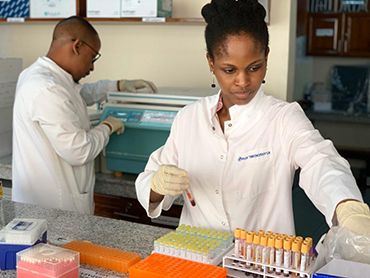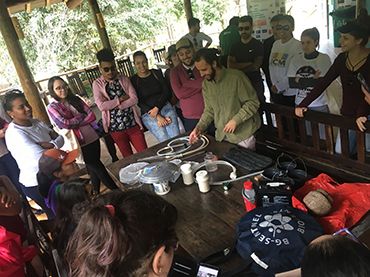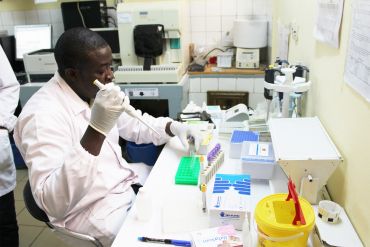Research
Oxford University is world-famous for research excellence. Our core commitment is to maintain originality, significance and rigour in research within a framework of the highest standards of infrastructure, training, and integrity.
Search below for a range of research stories by department or topic. These stories include impact case studies, videos, news and the research in conversation series. For more information please see individual department websites.

T-cell ‘training grounds’ behind robust immune system response seen in adenovirus vaccines
Writing in the journal Nature Immunology, they detail an investigation into one of the key features of adenovirus vaccines – their ability to generate strong and sustained populations of the ‘killer’ T-cell element of the i

Lateral flow tests are 95% effective at detecting Covid-19 when used at the onset of symptoms
A new study by researchers at the University of Oxford, Queen Mary University of London, Institute for Advanced Studies, Vienna, and the Medical University of Graz, has found that lateral flow tests detect Covid-19 with similar accuracy to laboratory-based PCR tests, providing they are used at th

High blood sugar levels ‘reprogramme’ stem cells
High levels of glucose in the blood ‘reprogrammes’ stem cells, leading to a lasting increase in the risk of developing dangerous atherosclerosis, according to research funded by the British Heart Foundation published today in Circulation.

Studying ancient civilisations develops 21st-century skills
Impact case study

SEREN: Improving blood-related diagnostics in sub-Saharan Africa
Impact case study

Influencing global policy on typhoid vaccination
Impact case study

Uncovering Europe’s Stories
Impact case study

Identifying risk and building resilience in complex infrastructure systems
Impact case study

Tackling blindness through gene therapy
Impact case study

Towards more equitable health research
Impact case study

Towards the circularity of plastics
Impact case study

Building the ‘infrastructure’ for innovation and translation
Impact case study

Malaria vaccine becomes first to achieve WHO-specified 75% efficacy goal
Researchers from the University of Oxford and their partners have today reported findings from a Phase IIb trial of a candidate malaria vaccine, R21/Matrix-M, which demonstrated high-level efficacy of 77% over 12-months of follow-up.

Alternating vaccines trial expands to include two additional vaccines
Our vaccine work is progressing quickly.

UK and EU regulators conclude benefits of vaccination continue to outweigh the risks
Our vaccine work is progressing quickly.

University of Oxford to study nasal administration of COVID-19 vaccine
The Phase I trial, which will enrol 30 healthy volunteers aged 18–40, will investigate the level of immune system responses generated by the vaccine using this delivery technique, as well as monitoring safety and for any adverse reactions.

‘Citizen scientists’ help researchers gather new insights into polar bear behaviour
The Arctic Bears Project is being led by Professor Douglas Clark, of the University of Saskatchewan, in collaboration with penguinologist Dr Tom Hart of Oxford’s Department of Zoology.

World Health Organization lists Oxford coronavirus vaccine for emergency use
Our vaccine work is progressing quickly.

PRINCIPLE trial finds antibiotics azithromycin and doxycycline not generally effective treatments for COVID-19
Azithromycin and doxycycline are two commonly used antibiotics investigated as separate treatments in the trial. Both drugs are being used by some doctors in the hope of treating COVID-19 in the early stages of the illness.
New insights from original Domesday survey revealed
A new interpretation of the survey behind Domesday Book – the record of conquered England compiled on the orders of William the Conqueror in 1086 – has emerged from a major new study of the survey’s earliest surviving manuscript.
Pages
Latest research news
Latest on Twitter
Follow @ResStaffOxfordOpen Access at Oxford
Oxford is committed to ensuring the widest possible access to its research
 Statins do not cause the majority of side effects listed in package leaflets
Statins do not cause the majority of side effects listed in package leaflets